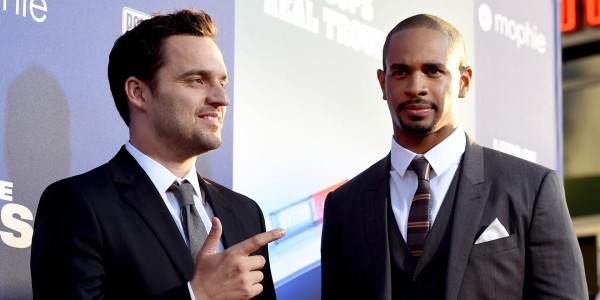Since Antoine Fuqua’s first hit music video over a decade ago, the director has been hard to pin down. When all that was known about Fuqua was his name, some imagined someone else entirely.
“All of a sudden, there was this hot new French director,” Fuqua remembers with a smile. “You should have seen their faces when I walked in the door.”
He hails far from Paris: the hard neighborhoods of Pittsburgh. After an early career shooting music videos for Prince, Coolio and Usher among others, Fuqua made his first feature film: the 1998 Chow Yun-Fat action movie “Replacement Killers.”
Since breaking through in 2001 with “Training Day,” which won Denzel Washington an Oscar, he has shown a reluctance to be pigeonholed by urban dramas.
He made the Bruce Willis action film “Tears of the Sun,” which dealt with a morally confusing refugee rescue in Nigeria; helmed a realistic, demystified take on the Knights of the Round Table in “King Arthur,” which starred Clive Owen; and directed the Martin Scorsese-produced blues documentary “Lightning in a Bottle.”
“In the process of making movies, I think that’s my statement: color doesn’t matter when it comes to storytelling,” says the 41-year-old black filmmaker. “When I first started directing features, I got a lot of urban stuff thrown at me.
“And I just didn’t want to do it, for better or worse. I just kind of felt, ‘Well, why do I have to do that?’ My contribution to the industry, I want it to be more than that.”
Refreshingly blunt thrillerFuqua’s new movie “Shooter” stars Mark Wahlberg as a former sniper who’s framed by the U.S. government as an assassin.
The film — which might fairly be called “Rambo” meets “Fahrenheit 9/11” — is overflowing with nonpartisan rage at two-faced politicians. It’s refreshingly blunt, and includes references to the missing weapons of mass destruction in Iraq and suggestions of corruption at the highest levels. The 9/11 Commission report even makes a cameo.
Like a B-movie of decades ago, “Shooter” is the sort of film a social historian could love, even if critics don’t. “Shooter” is also well in line with a trend in Fuqua’s films.
“It’s the abuse of power,” he says, explaining that the theme comes from his love of the legendary Japanese filmmaker Akira Kurosawa. “Nobody’s innocent — that’s my favorite line from ‘Training Day.’ Everybody’s got dirt.”
Slideshow 26 photos
Celebrity Sightings
Fuqua, whose father worked at the H.J. Heinz Co. in Pittsburgh, took refuge in movies from the violence around him. As a teenager, he was shot on his right side while running down an alley, the bullet just missing his lungs. When a close friend was later killed in high school, Fuqua committed to altering his path.
He went to West Virginia State with a scholarship to play basketball (he still wakes at 5 a.m. daily to workout and box) and then transferred to West Virginia University to study electrical engineering. He soon thereafter moved to New York to get into film, beginning as a production assistant. Eventually, he used his rent money to shoot a short film (“Exit”) that got him his first music video work.
Fuqua was catapulted by the success of “Training Day,” and now lives in Beverly Hills with his wife and three kids.
‘Heartbroken’ over ‘American Gangster’Fuqua believes he would have made another sensation with “American Gangster,” a film based on a Harlem drug lord (to have been played by Denzel Washington) who smuggled heroin in the caskets of soldiers killed in Vietnam. Fuqua was removed by the studio, Universal, a month before the start of production in late 2004.
Universal has said Fuqua was fired over “creative differences” and reports at the time suggested the studio was concerned over a budget that grew to near $80 million. Fuqua, still smarting from the experience, believes he wanted to take a grittier, more realistic approach than was desired.
“‘Training Day’ opened up doors, ‘American Gangster’ shut ’em,” says Fuqua. “Eventually you go off and make another movie and everybody wants to know if you behaved — as if it were my fault.”
Fuqua says he’s still “heartbroken” but that he’s over any animosity he felt and simply wishes he had made the movie. The production was reassembled last year with Ridley Scott (“Gladiator,” “Blade Runner”) directing Washington and Russell Crowe and is scheduled to be released in November.
Instead, Fuqua is in the early stages of planning a much anticipated biopic on Notorious B.I.G. And this summer he hopes to this summer “Without a Badge,” about an undercover federal narcotics investigator. Whether Wahlberg joins that film or not, Fuqua thinks the actor will be a frequent collaborator — and Wahlberg feels similarly.
“He does not like to stop working,” Wahlberg says of Fuqua, describing him as “extremely collaborative.” “He’s just got a drive.”
Fuqua, who has typically worked in the studio system, also hopes to soon do smaller films to fully express his point of view, but admits he most wants to entertain people. After the “American Gangster” fallout, he knows it can be difficult to do both.
Says Fuqua: “It taught me — just like when I took my rent money and shot a short film — I’m always going to have to do it myself to make my breaks.”
